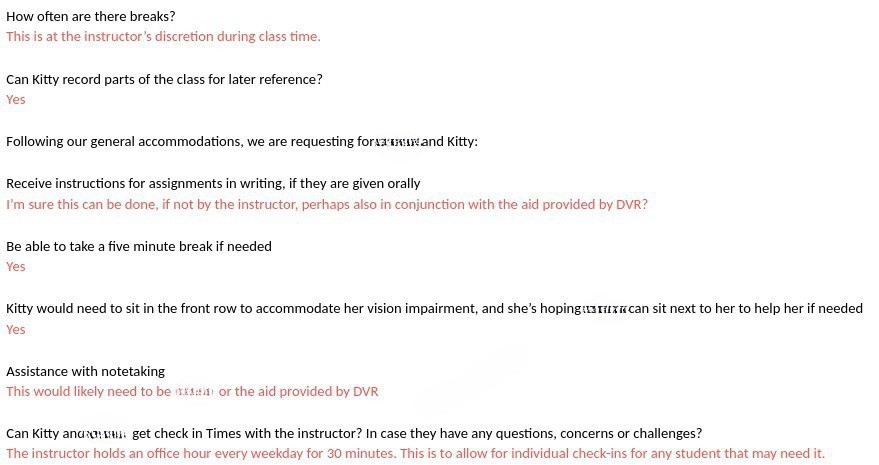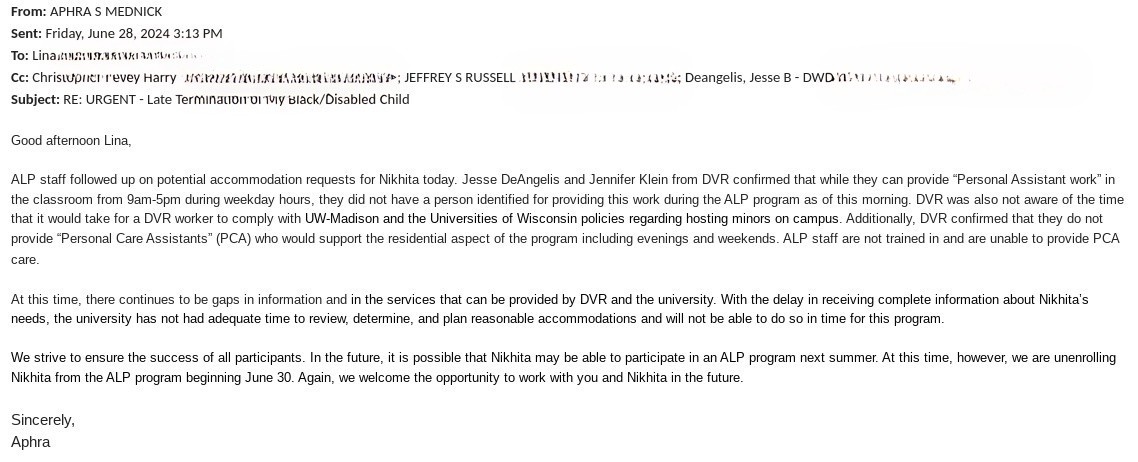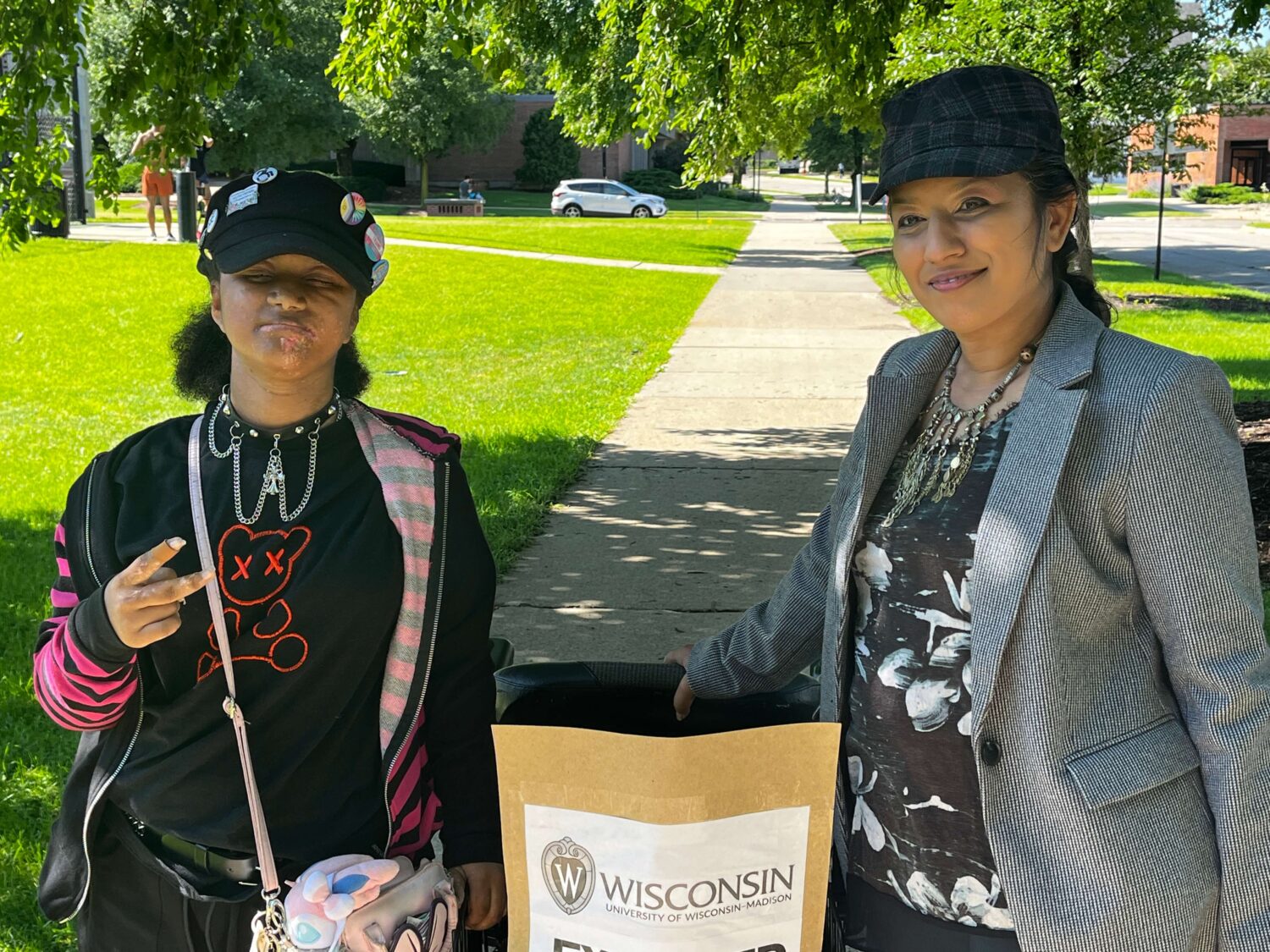The University of Wisconsin has excluded a 14-year-old ninth grader from a precollege summer program because it is unable to accommodate the student’s disabilities, Madison365 has learned.
Nikhita Steward-Trivedi, a rising ninth grader in Beaver Dam, was accepted into UWs Accelerated Learning Program (ALP), a three-week residential program for academically gifted students, to take a course in art and activism.
“I want to be an animator when I grow up,” Steward-Trivedi said in an interview Wednesday. “I know that the industry is rough. But I love drawing, I love bringing my characters to life. And I thought activism, combined with that, would be an awesome class for me to take.”
Steward-Trivedi also lives with Goltz syndrome, a rare genetic disorder that affects multiple organs as well as the development of the skin, hands, feet and eyes. Nikhita, who goes by Kitty, has mobility challenges, vision impairment and chronic pain.
“A massive disconnect”
Steward-Trivedi, who prefers gender-neutral pronouns, has gotten support from the state Department of Workforce Development’s Division of Vocational Rehabilitation (DVR), which helps people with disabilities join the workforce, since they became eligible at 14. DVR agreed to pay the $4,300 tuition, room and board for Kitty to attend the ALP, and to help coordinate classroom accommodations.
“All of their teachers, entire IEP team, medical team, mental health team, everybody banded together to write letters and advocate for them to get into this program, because they believe that this program is just going to make such a change in terms of how (Kitty) perceives education,” Lina Trivedi said.
Lina Trivedi said she spoke with Katie Effertz, Associate Director of Operations and Residential Programs at UW, before applying to be sure the program could accommodate Kitty. Effertz assured her it could, Trivedi said.
Trivedi said she recalls Effertz saying, “We always find ways to make things work. And we’re communicating now. And this is all gonna work out.”
Listen to reporter Robert Chappell and cohost Stephanie Díaz de León talk through this story, with the voices of Kitty and Lina, on today’s edition of the 365 Amplified podcast, here or your favorite podcast app:
Kitty was accepted into the program in April, and Lina Trivedi began communicating with program coordinators about Kitty’s unique needs shortly thereafter. She was assured that most of Kitty’s needs could be accommodated, according to emails reviewed by Madison365.
“From the beginning, I was told … to talk to the McBurney Disability Resource Center, which we went to, but there is a rule or guidance that the McBurney Disability Resource Center does not work with high school students,” Lina Trivedi said. “But all this time, everything was fine and we had everything worked out.”
Until they didn’t. “Obviously, there was a massive disconnect,” Lina said later.
Kitty had surgery in May, which delayed Lina’s ability to correspond with program coordinators or fill out enrollment forms by the May 15 deadline. One of those forms asks whether the student requires any accessibility accommodations. But she was able to catch up on paperwork in late May and early June – which program coordinators assured her was acceptable.
“Nikhita recently had surgery and I’m just getting my head above water,” she wrote to program manager Jamison Wendlandt on June 4. “I know that DVR has been in touch with you regarding payment, but I have a bunch of paperwork that I probably need to fill out. What is the best way for me to get caught up with everything you need?”
“No worries,” Wednlandt responded, providing a link to the forms.

On June 19, Lina met with Wendlandt, and sent a list of questions before the meeting. In his responses, Wendlandt indicated that most of the minor accommodations Kitty requires – assistance in notetaking, ability to sit near the front of the classroom, extra time to complete assignments, et cetera – could be given. However, he wrote, UW could not allow a personal care aide in the dormitories and could not provide a classroom aide.
Lina Trivedi already knew at that point that only program staff are allowed in the dorms, so no personal care aide would be able to assist Kitty outside the classroom. However, a classroom aide would still be necessary.
“The biggest piece is trying to figure out how to connect Kitty with an aide in the class,” Lina wrote. “Kitty’s DVR counselor had indicated that DVR would be willing to fund the cost of it, if it is something the university is not able to provide. However, I needed to figure out what the process would be for having that fulfilled. Do we need to identify someone to do that through DVR, or does the university have special need aids available? The primary purpose for this is so that Kitty has assistance with notetaking and troubleshooting vision and access challenges as they occur so that her experiences in the class are on pace with the rest of her classmates.”
“Badger Precollege is not able to provide personal attendants for the classroom or in the residential space,” Wendlant responded. “We have worked with folks in the past who have provided an aide in the classroom and some other daily activities. However, our residential policies do not allow non-program staff in the residential space due to a variety of youth protection policies. Let’s connect more on this during our call later so we can get a better idea of what this may look like.”
Trivedi wrote back that the personal care aide in the dorm was not necessary, as Kitty was independent enough to care for herself.

Trivedi told Madison365 that Kitty’s DVR caseworker assumed the university could provide a classroom aide, and that DVR would cover the cost. When it became apparent on June 19 that the university would not provide an aide, Trivedi and the caseworker, Jesse Deangelis, got to work to find one. By that Friday, June 21, Deangelis wrote in an email to Trivedi that she was in touch with an agency in Sun Prairie that was a “solid maybe.”
On June 26, Deangelis wrote to Wendlant with a detailed list of necessary accommodations, most of which Wendlant had previously agreed to. Later that day, Lina Trivedi visited campus and met with Effertz, who, Trivedi said, indicated that the university would be unable to accommodate Kitty’s disability, and suggested that they commute instead of participate in the residential portion of the program.
Trivedi declined that option.
“I do not want to give my child a message that she cannot participate 100% in the program we signed up for because she has a disability,” she said.
That evening, Trivedi wrote to Associate Dean of Continuing Studies Aphra Mednick, seeking assistance navigating the situation.
“Four days prior to checking in to DeJope Residential Facilities, Katie informed me that my child is being terminated from the program due to her disabilities being more than what the program is prepared to accommodate,” Trivedi wrote. “I indicated to Katie in this conversation that DVR is meeting all of her accommodation needs, and after many in-depth emails and in-person meetings with ALP staff on campus over the last four weeks to coordinate DVR’s support, I am confused as to why my child is potentially being terminated after all the accommodations needed have already been funded or committed by DVR.”
In the meantime, Trivedi and DVR continued to search for a classroom support aide. They ultimately connected with an agency based in Sun Prairie who were able to put together a schedule using several different aides to cover Kitty’s classroom time. The agency sent a proposed schedule for the first two weeks to Trivedi on the afternoon of June 27, with the intention to finalize the third week’s schedule soon thereafter. Madison365 has reviewed that schedule but has not been in contact with the agency.
Mednick wrote to Trivedi on June 27 that accommodations require time to plan for, and that UW received the request too late. After Trivedi responded listing all the accommodations Wendstadt, the program manager, had agreed to, Mednick wrote back again on Friday, June 28, saying she had spoken to DeAngelis, the DVR caseworker, and wrote, “while they can provide ‘Personal Assistant work’ in the classroom from 9 a.m.-5 p.m. during weekday hours, they did not have a person identified for providing this work during the ALP program as of this morning. DVR was also not aware of the time that it would take for a DVR worker to comply with UW-Madison and the Universities of Wisconsin policies regarding hosting minors on campus.”

Trivedi said that was the first mention of such policies. UW officials did not respond to inquiries about what policies Mednick referred to.
Mednick went on to write, “In the future, it is possible that Nikhita may be able to participate in an ALP program next summer. At this time, however, we are unenrolling Nikhita from the ALP program beginning June 30.”
Lina and Kitty still turned up on June 30 to help another student, whom Lina had also helped apply for the program, get moved in and settled – and to do a little activism.
“I told Kitty that there’s two ways to learn advocacy,” Lina said. “You can learn it in a classroom, and you can learn it on the street. I’m like, we’re still gonna go, and we will figure this out. And we’re gonna figure out how to make a change, because that’s what’s most important to her.”
That day they met with Mednick and another administrator. Lina said one of them asked what would happen if Kitty had to go to the bathroom at night.
“I use the wheelchair for a long distance, because I have a prosthetic leg and my leg will get sore if I walk long distances. But short distances, I can walk just fine,” Kitty told Madison365. “So if I have to go to the bathroom, you know what I’ll do? I’ll go to the frickin’ bathroom.”
Mednick’s concern wasn’t a surprise for Dr. Sami Schalk, author of Black Disability Politics and a professor of gender and women’s studies at the University of Wisconsin.
“Often folks base their understanding of what disabled people are capable of by visual appearance,” she said. “They’re going to look and make a decision without actually listening … The refusal to believe disabled people about what they’re capable of doing, based on a visual assessment by a stranger, is just such a common ableist tactic.”
Trivedi said Mednick also suggested Kitty could just come to the third week of the program and look at coming to the full program next year – an idea Kitty declined. Mednick emailed Lina later that day suggesting another program available in the fall, a program that Lina said didn’t align with Kitty’s goals.
UW spokesman John Lucas said in an email to Madison365 that “some information that has been shared about this situation is inaccurate or misleading,” but didn’t specify what inaccurate information was shared or where it was shared.
“UW-Madison did not deny any accommodation to support the student in classroom and residential settings,” he wrote, despite UW-Madison declining to provide a classroom aide or personal care assistant in the residential setting. “Information that was required from the family to participate was provided to the program weeks late and was incomplete. As a result, and without adequate time to coordinate with on- and off-campus partners, UW-Madison has not had sufficient time to review, determine, or plan for a reasonable accommodation. It was communicated prior to the start of the program that the student could not attend the current session. Additional options for participation were communicated to the family several weeks prior to the program start. This included the possible participation in the existing commuter option, which is open to all students. The family has declined this offer as well as an offer to participate in the final week of the program or a fall program.”
Trivedi acknowledges that the option to commute was presented early on, just as it is for every student, but all parties agreed that Kitty could manage the residential program without a personal care assistant.
Lucas did not respond when asked how the commuter option would have solved the problem of the availability of classroom aides.
“Things need to change”
Lina and Kitty Trivedi have been on campus all week, Kitty’s wheelchair adorned with signs reading “University of Wisconsin expelled me because I have a disability” and “Ableist Learning Program.” They’ve gotten support from the UW Black Power Coalition and the UW Disabled Student Union, who have been sharing the story on social media and protesting alongside the Trivedis.
Mednick has told both Kitty and Lina that they are not allowed to speak with anyone involved in any precollege programs, and wrote a letter to Lina calling her presence and behavior “disruptive” and warning her not to interact with program participants or staff.
Mednick also wrote an email to all program participants to “make you aware of a situation … There has been no disruption to the residential or classroom experience. A family who feels their student has been unfairly unenrolled in the program is exercising their right to demonstrate near the program and the surrounding area.”
“It makes absolutely no sense to me,” Schalk said. “It just seems like they are trying to quash this to make sure that nobody knows what happened and hope that it goes away. But it doesn’t look like it’s going away.”
Lina Trivedi said at this point it’s about changing systems to better accommodate the next student with a disability.
“I am in so many special needs moms groups and I see all kinds of moms struggling with this very issue. This happens all the time, not just at UW but across the board, at camps, at schools, everywhere,” she said. “I really want UW to fix the situation so it doesn’t happen (again). And the way that I see fixing it is that anybody who has an IEP, that’s a high school student that’s enrolling in a program needs to immediately be referred to the McBurney Disability Resource Center to be able to access their services and advocacy right from the beginning, because someone over there can navigate the red tape that I had to navigate, that I thought I navigated, but apparently I didn’t.”
“Things need to change,” Kitty Steward-Trivedi said. “Simple, it’s really simple. The whole thing just needs to change.”
Lina and Kitty are documenting their protests on Instagram.

